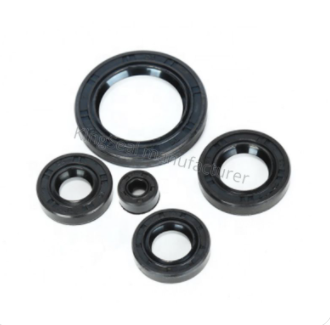How Do I Choose the Right Oil Seal Kit?
In the intricate world of machinery and equipment, the importance of maintaining smooth operations cannot be overstated. A vital component of this maintenance is ensuring that your machinery's moving parts are adequately protected and sealed. This is where oil seal kits come into play. These kits are designed to prevent leaks, contamination, and premature wear in machinery, making them an essential consideration for any responsible equipment owner. However, choosing the right oil seal kit can be a daunting task, given the variety of options available. In this article, we'll guide you through the process of selecting the perfect oil seal kit for your needs.
Understanding the Basics of Oil Seal Kits:
Before delving into the selection process, let's grasp the basics of oil seal kits. An oil seal, also known as a shaft seal or rotary seal, is a vital component in machinery that prevents fluids from leaking out or contaminants from entering. These seals are particularly important in engines, gearboxes, pumps, and other mechanical systems where different fluids are used, and precision is key.
Oil seal kits typically contain all the necessary components to replace a worn or damaged oil seal. These kits often include the seal itself, as well as any additional parts required for installation, such as gaskets or retaining rings. Having a comprehensive kit on hand can save you time and effort during maintenance tasks.
Factors to Consider When Choosing an Oil Seal Kit:
Application and Compatibility:
The first step in selecting the right oil seal kit is understanding the specific application for which it will be used. Different machinery and equipment have varying requirements in terms of seal size, design, and material. Identify the type of equipment you have and its operational conditions. Is it an engine, a hydraulic system, or an industrial pump? Ensure that the oil seal kit you choose is compatible with your machinery's make and model.
Dimensions and Measurements:
Precise measurements are crucial when it comes to oil seal kits. A slight mismatch in dimensions can lead to poor sealing performance or even complete failure. Accurately measure the shaft diameter, bore diameter, and width of the seal housing. Additionally, consider the seal's lip diameter and thickness. These measurements will help you select a kit that fits snugly and functions optimally.
Material Compatibility:
Oil seals are available in various materials, each suited to different operating conditions. Common materials include rubber, silicone, polyurethane, and fluorocarbon. Consider the type of fluid the seal will be exposed to—whether it's oil, water, chemicals, or a combination—and choose a material that is compatible with these fluids. Different materials have varying resistance to temperature, pressure, and chemical exposure.
Operating Conditions:
The environment in which your machinery operates plays a crucial role in the performance of the oil seal. Factors such as temperature fluctuations, pressure variations, and exposure to harsh chemicals can impact the seal's longevity and effectiveness. Ensure the chosen oil seal kit is designed to withstand the specific operating conditions your equipment will face.
Quality and Brand Reputation:
Opting for a reputable brand is a wise choice when it comes to oil seal kits. Established brands often have a track record of producing reliable and durable products. Reading reviews and seeking recommendations from professionals in your industry can provide valuable insights into the best brands and products available.
Installation Complexity:
Consider your own mechanical skills and the complexity of the installation process. Some oil seal kits might require specialized tools or advanced technical knowledge to install correctly. If you're not confident in your abilities, it might be wise to seek assistance from a professional mechanic or technician.
Cost and Value:
While cost is an important consideration, it should not be the sole determining factor. A slightly higher upfront investment in a high-quality oil seal kit can save you from frequent replacements and potential downtime in the long run. Balance the cost with the expected lifespan and performance of the kit.
Steps to Select the Right Oil Seal Kit:
Gather Information:
Collect all relevant information about your machinery, including its make, model, operating conditions, and the specific part requiring an oil seal replacement.
Measure Accurately:
Use precise measuring tools to obtain accurate dimensions of the shaft, bore, and seal housing. Double-check your measurements to avoid errors.
Research and Compare:
Explore different oil seal kit options available in the market. Compare their specifications, materials, and compatibility with your machinery.
Check Material Compatibility:
Ensure the selected seal material is compatible with the fluids and conditions your machinery will encounter.
Consider Installation Complexity:
Evaluate your own capabilities and decide whether you can confidently install the seal yourself or if professional assistance is necessary.
Factor in Quality and Brand Reputation:
Prioritize reputable brands known for producing reliable seals. Read reviews and gather recommendations from trusted sources.
Balance Cost and Value:
While cost matters, prioritize the long-term value and performance of the oil seal kit over the initial price.
Conclusion:
Selecting the right oil seal kit is a critical task that requires careful consideration of various factors, from the application and dimensions to material compatibility and installation complexity. By taking the time to gather accurate information, research different options, and prioritize quality, you can ensure that your machinery remains well-protected, reducing the risk of leaks, contamination, and premature wear. Remember, investing in the right oil seal kit today can lead to smoother operations and reduced maintenance costs in the long run.



